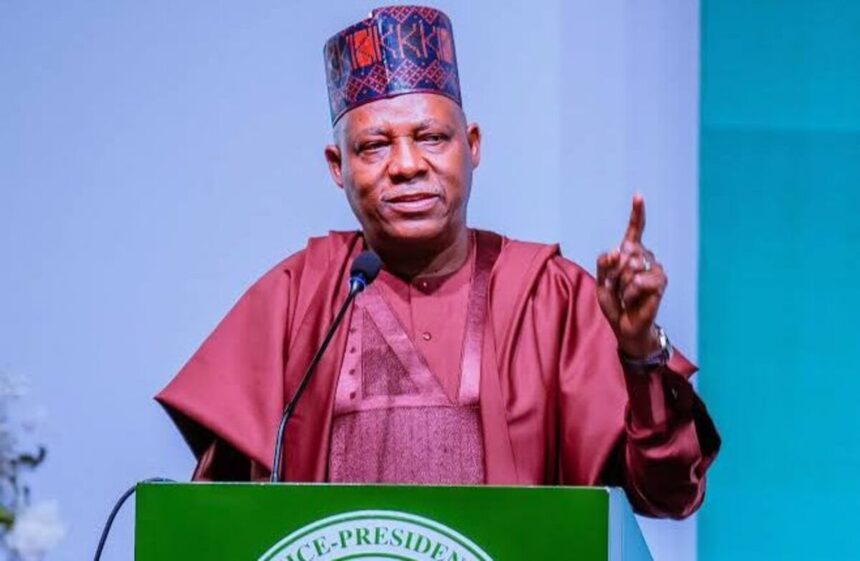Vice President Kashim Shettima has reaffirmed the Federal Government’s commitment to leveraging the National Homegrown School Feeding Programme (NHGSFP) as a strategic tool for economic growth, financial inclusion, and national security, describing it as an essential component of Nigeria’s journey towards a $1 trillion economy by 2030.
Represented by his Special Assistant on Economic Affairs, Mr. Tope Fasua, at the National Policy Forum on Institutionalisisation and Implementation of the Homegrown School Feeding Programme in Abuja on Friday, the Vice President said no Nigerian farmer should be excluded from the prosperity their labour creates.
The one-day policy forum was organised by ActionAid Nigeria in collaboration with the Presidential Committee on Economic and Financial Inclusion (Pre-CEFI), the Nigeria Governors’ Forum, and other stakeholders.
He noted that under President Bola Tinubu’s Renewed Hope Agenda, the relaunch of the NHGSFP marks a decisive shift toward large-scale, systemised delivery aimed at boosting school enrollment, improving learning outcomes, and raising incomes among smallholder farmers.
Shettima revealed that alongside the core programme, the federal government has expanded its reach with the Alternate Education and Reviewed Home School Feeding Project, targeting out-of-school and highly vulnerable children with the goal of reaching up to 20 million beneficiaries by 2026.
“A child with knowledge is less vulnerable to exploitation. A farmer connected to a guaranteed market is less exposed to economic despair. Communities where youth are engaged are less vulnerable to insecurity,” he said and highlighted the use of digital technology to ensure accountability and efficiency.
Acknowledging the scale of the programme, Shettima disclosed that maintaining nationwide coverage could require around N1 trillion annually but insisted that the returns far outweigh the cost in terms of peace, productivity, and resilience.
The Vice President urged donors to support state-level compacts and align procurement with local agricultural produce and also called on the private sector to invest in logistics, warehousing, processing, and payment systems, describing the programme as a “daily national transaction that teaches better, farms better, pays better, and secures better.”
“If we tie nutrition to learning, procurement to inclusion, and opportunity to peace, the road to a $1 trillion economy will be paved with one nourishing meal after another, served in every public classroom,” he concluded.
Earlier in his keynote address, the Minister of State for Humanitarian Affairs and Poverty Reduction, Dr. Tanko Yusuf Sununu, also reaffirmed FG’s commitment to strengthening and institutionalising the National Home-Grown School Feeding Programme (NHGSFP), describing it as a critical pillar for human capital development, sustainable economic growth, and financial inclusion.
Speaking through the Director, Social Development in the ministry, Mr. Valentine Ezulu, the Minister said, the initiative goes beyond feeding schoolchildren — it is a legacy programme that touches multiple sectors and drives national transformation.
“This programme is not just about feeding children. It is about nation-building. A nourished child is more likely to attend school, pay attention in class, and succeed academically. It combats malnutrition and stunting, boosts local agriculture by sourcing food from smallholder farmers, and empowers women and youth through economic opportunities.”
Despite its successes, the Minister noted several pressing challenges, including funding sustainability, weak institutional frameworks, transparency gaps, limited integration of financial inclusion strategies, nutrition and quality control issues, as well as data deficits.
“These issues must be addressed if the NHGSFP is to reach its full potential. We are determined to institutionalize it through strong legal, financial, and policy frameworks, ensuring that every Nigerian child has the right foundation for a brighter future”, he said.
Also speaking at the high-level forum, the President of the ECOWAS Commission, Dr. Omar Alieu Touray, praised President Tinubu for his personal dedication to regional integration and the advancement of ECOWAS Vision 2050 – “ECOWAS of the People: Peace and Prosperity for All by 2050.”
Represented by Mr. Alain Traore, Director of Agriculture and Rural Development at the Commission, Dr. Touray emphasised that children’s education is a cornerstone for developing human capital in the region. He highlighted school feeding, especially when based on local agricultural production, as a promising strategy to enhance education and food security.
Citing data from the Global Child Nutrition Foundation (GCNF), Traore revealed that 25 million children benefited from school feeding programmes in West Africa in 2024—representing just 32% of primary school-aged children. “This shows that the overall coverage rate is still low, despite the efforts made by governments and development partners,” he said.
To address this gap, ECOWAS, with financial support from the Spanish Cooperation, is investing €4.5 million to promote integrated school feeding models across West Africa and added that, currently, 16 field projects led by non-governmental organisations are underway, including two in Nigeria. The initiative aims to develop scalable practices and ensure the long-term sustainability of school feeding programmes.
In his welcome address, the Country Director of ActionAid Nigeria, Dr. Andrew Mamedu, noted that institutionalising school feeding is central to ActionAid’s 10-year Country Strategy, which seeks to lift at least five million Nigerians out of poverty by 2034.
Mamedu expressed concern about the state of education in Nigeria, revealing that while basic school enrolment increased from 35 million to 40 million between 2018 and 2022, the number of out-of-school children also rose to 14.6 million in 2020.
“Today, over 45 million Nigerian children aged 5–14 cannot read a simple sentence by age 10, with 15 million completely out of school,” he said, attributing the crisis to underfunding, weak governance, and systemic inefficiencies.
He reaffirmed ActionAid Nigeria’s support for the Federal Government’s Home-Grown School Feeding Programme, which he described as a “proven pathway” to reversing the trends.
According to Mamedu, the school feeding programme under the previous administration achieved significant success, saying that, in some states, school enrolment increased by 28 per cent, while pupil retention improved by over 50 per cent.
Nationwide, the programme provided nearly 7 million children across 40,000 public schools with daily nutritious meals and created employment opportunities for thousands of cooks and smallholder farmers.
The forum brought together key stakeholders, including policymakers, development experts, civil society organisations, and community leaders, to chart a path forward for the institutionalisation and effective implementation of the programme.
ALSO READ TOP STORIES FROM NIGERIAN TRIBUNE
WATCH TOP VIDEOS FROM NIGERIAN TRIBUNE TV
- Let’s Talk About SELF-AWARENESS
- Is Your Confidence Mistaken for Pride? Let’s talk about it
- Is Etiquette About Perfection…Or Just Not Being Rude?
- Top Psychologist Reveal 3 Signs You’re Struggling With Imposter Syndrome
- Do You Pick Up Work-Related Calls at Midnight or Never? Let’s Talk About Boundaries







